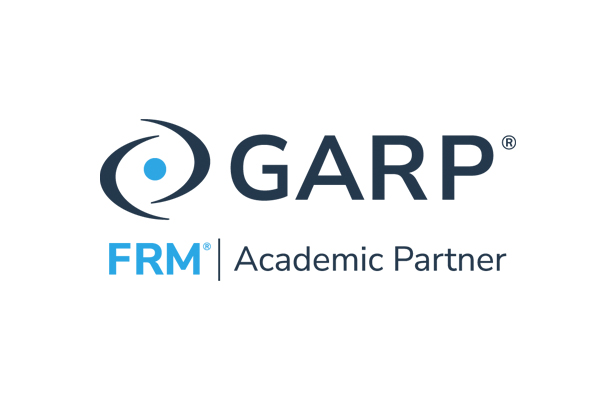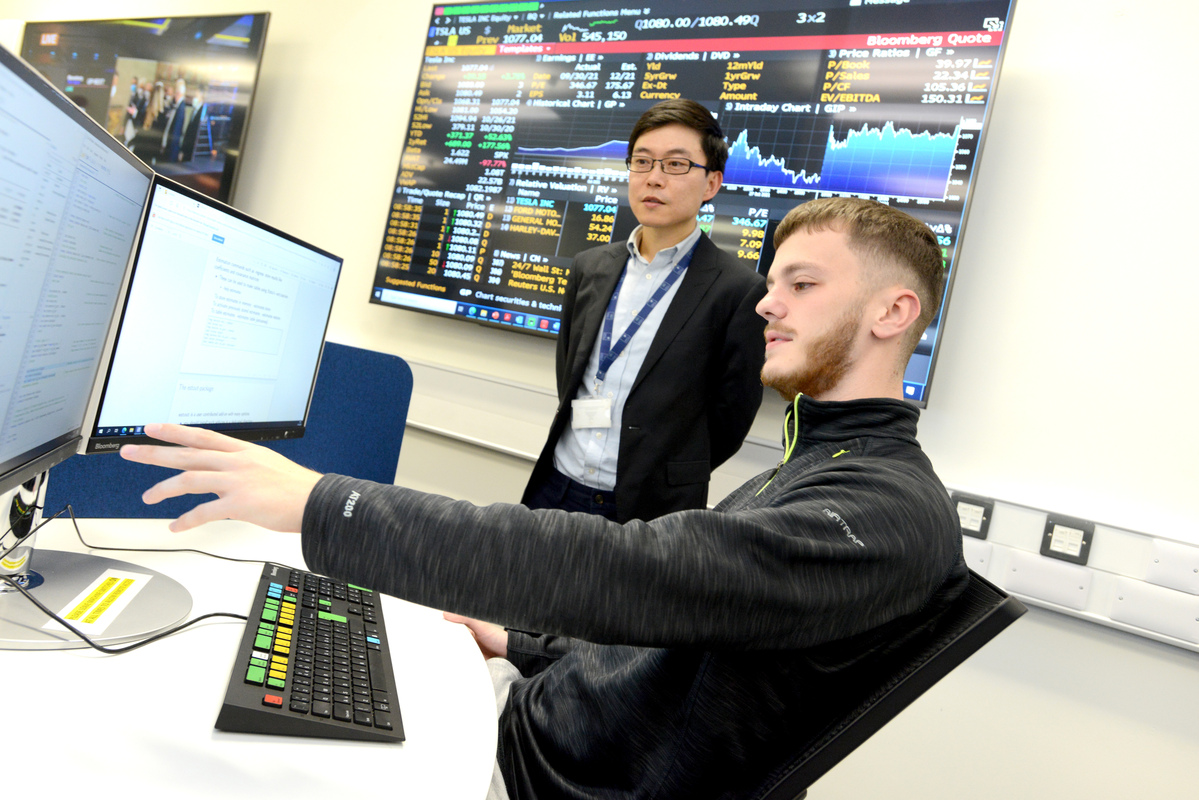Why Choose Lincoln
Delivered by a diverse, international teaching team
Flexible study pathways to align with your career aspirations
Access to the industry-standard Bloomberg Terminal
Hear from visiting speakers from industry

MSc Banking and Finance is designed to prepare students for a career in the financial sector, where demand is high for specialists with knowledge of corporate finance, banking and financial market, investment and sustainable financial management.
In line with the latest developments and challenges within the global financial services sector, the programme is designed to provide advanced skills, essential for a successful career in retail, commercial, sustainable finance, investment and private banking.
The core curriculum encompasses a diverse range of subjects including finance, economics, quantitative methods, and fintech. Students will delve into the latest financial theories, acquire advanced skills to analyse financial matters and critically examine the current challenges and issues facing financial institutions.
In addition to the standard MSc Banking and Finance route, students can select from two additional pathways which lead to the awards of MSc Banking and Finance (Finance and Investment) or MSc Banking and Finance (Sustainable Financial Management), allowing students to align their academic journey with their career aspirations and areas of expertise.
Delivered by a diverse, international teaching team
Flexible study pathways to align with your career aspirations
Access to the industry-standard Bloomberg Terminal
Hear from visiting speakers from industry

The MSc in Banking and Finance is a one-year Master's course combining advanced study and research. The base programme includes four core modules: Fintech, Applied Corporate Finance, Portfolio Analysis and Responsible Investing, and Sustainable Financial Reporting. The remaining modules are defined by choice of pathway.
The first term gives a comprehensive foundation knowledge of financial markets, institutions, and intermediaries, along with a focus on understanding the role of banks and other institutions within this framework.
From the second term, students will have the opportunity to explore one of the following specialisations: Banking and Finance, Finance and Investment, or Sustainable Financial Management. Students following the Finance and Investment route can study specialist topics such as fixed income and wealth management and investment and valuation. Students following the Sustainable Financial Management pathway can study topics such as sustainable financial reporting and the green economy and sustainable development governance.
Each student will be expected to write a dissertation, giving the opportunity to work with one of the Department's experienced lecturers on a selected topic and apply your knowledge to a specific problem.
Assessment methods reflect the differing theoretical and practical approaches and learning outcomes of each individual module. These methods will vary from module to module. Each student will also be expected to write a dissertation, providing the opportunity to work with one of the Department's experienced lecturers on a selected topic and apply your knowledge to a specific problem.
The standard MSc Banking and Finance course has been approved as an academic partner for the Financial Risk Manager certification by GARP, the world's leading organisation for risk managers. As part of the FRM University Affiliation Course, eligible students can apply for FRM scholarships that cover the cost of registration for the FRM examination. Approval is currently pending for the named pathway programmes. The University is also in process of applying for University Accredited Partner Affiliation with the CFA Institue.
Discover More
Our approach to teaching incorporates a range of innovative elements aimed at providing students with practical exposure to financial markets. One of the key highlights of the academic year is our financial markets simulation events delivered by Amplify Trading. Amplify Trading is an award-winning FinTech company offering professional training solutions to the world’s largest financial institutions (including Bank of America/Merrill Lynch, Deutsche Bank, UBS, S&P).
During the simulation events, students can use the FlowTrader platform to experience the different roles, operations, and objectives within financial markets, operating on simulated or real market prices. Our students may also have opportunities to gain a place on the Amplify Summer Analyst Programme.
Through the academic year, our students have the chance to hear from experts from a wide range of industries who will share their knowledge. Previous speakers include Director of Financial and Strategic Risk at NatWest Group, Dr Alessandra Mongiardino, and mathematician, Dr Simon Smith.
Students can use our Bloomberg Terminal, which is designed to help industry professionals make better-informed investment decisions by offering the latest market news along with historical data and an international network to communicate securely and reliably. Bloomberg offers a practical resource for students to reinforce the theories they learn in lectures, and enable them to become familiar with the tools used by today’s financial services professionals.

Lincoln International Business School offers the Student Managed Investment Fund (LSMIF), which is an investment fund created, operated, and maintained by students within the school, with everything running within the real-world environment of finance.
One of only a handful of its kind in the UK, students will be managing real money with the objective of making positive returns while managing risk. Industry veteran and long-time lecturer Hao Quach can help support the students throughout, utilising his years of experience in all aspects of investment banking and 20 years teaching in many countries.
Postgraduate Application Support
Applying for a postgraduate programme at Lincoln is easy. Find out more about the application process and what you'll need to complete on our How to Apply page. Here, you'll also be able to find out more about the entry requirements we accept and how to contact us for dedicated support during the process.
How to Apply
This is a non-specialist degree and although a background in the subjects covered is welcome, it is not essential. The entry requirements are a minimum of a 2.2 honours degree or equivalent and grade B in GCSE Mathematics or equivalent. Evidence of quantitative methods or mathematics during an undergraduate degree (or A Level Grade C or above in Mathematics) is valuable.
Students from a variety of backgrounds are encouraged to apply and applicants may be invited for interview to provide effective information and guidance or for non-standard entry.
Overseas students will be required to demonstrate English language proficiency equivalent to IELTS 6.0 overall, with a minimum of 5.5 in each element. For information regarding other English language qualifications we accept, please visit the English Requirements page https://www.lincoln.ac.uk/studywithus/internationalstudents/englishlanguagerequirementsandsupport/englishlanguagerequirements/.
For further advice on IELTS and the support available, please contact the International College by email at internationalcollege@lincoln.ac.uk.
You will need to have funding in place for your studies before you arrive at the University. Our fees vary depending on the course, mode of study, and whether you are a UK or international student. You can view the breakdown of fees for this programme below.
The University offers a range of merit-based, subject-specific, and country-focused scholarships for UK and international students. To help support students from outside of the UK, we offer a number of international scholarships which range from £1,000 up to the value of 50 per cent of tuition fees. For full details and information about eligibility, visit our scholarships and bursaries pages.
Postgraduate Funding Options
Find out more about the optional available to support your postgraduate study, from Master's Loans to scholarship opportunities. You can also find out more about how to pay your fees and access support from our helpful advisors.
Explore Funding Options
This programme with pathways is designed to provide you with advanced skills essential for a successful career in retail, commercial, sustainable finance, investment or private banking.
This course is ideal for those wanting to work as a loan officer, private banker, private wealth consultant, or contribute to the back and middle offices of an investment bank in roles such as risk management, sustainable finance and reporting, or support services.
For more information about this course, please contact the Programme Leader.
Dr Samy Amer
samer@lincoln.ac.uk
Lincoln International Business School works with students and organisations to enhance the contribution of business to society. For students, that means developing their business skills and knowledge to improve their career readiness.The University of Lincoln is a member of AACSB, a global nonprofit association connecting educators, students, and businesses to achieve a common goal: to create the next generation of great leaders.
About the AACSB
To get a real feel for what it is like to study at the University of Lincoln, we hold a number of dedicated postgraduate events and activities throughout the year for you to take part in.
Upcoming Postgraduate Events